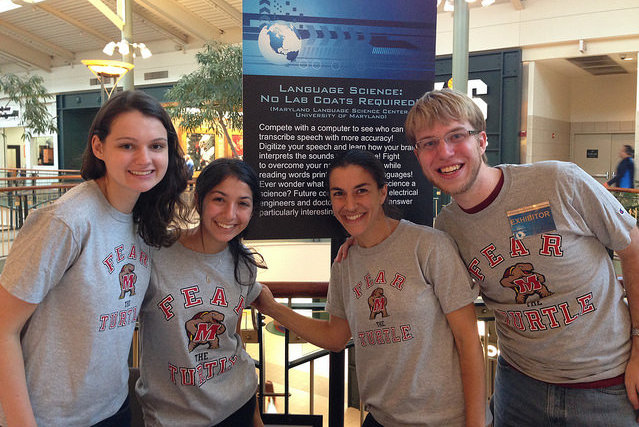Introducing the Language Science Center Fellows Program
December 03, 2013
Maryland Language Science Center

The Maryland Language Science Center is launching a new Language Science Fellows program, which aims to provide PhD students with training in interdisciplinary research and leadership. We are seeking your feedback on a draft proposal that has been developed by a joint student-faculty team. The new program builds directly on the successes of the NSF-IGERT program in language science , currently in its 6th year. The program aims to provide the benefits of interdisciplinary training to a broader group of PhD students, despite the ramp down of the initial NSF award. Funding for the program is being pursued through multiple sources. The Language Science Fellows program will provide a number of benefits to participating students, including: developing research skills not normally available in a single department or programparticipation in collaborative researchdeveloping leadership skills through student-led initiativesincreased success via support from a strong and diverse peer networkincreased success via developing an integrated training and research planlearn to communicate with diverse groups, and contribute to scientific outreachfunding for research and travelsome supplemental stipend support (full fellowships not available, at least not initially)playing an integral role in shaping the largest language science community in North America, a University of Maryland priority area The experience of the past 6 years has shown us that there is great demand for students with diverse skills, but also that successful interdisciplinary training requires much more than just soaking up knowledge or techniques from multiple areas. Success requires that students become engaged, entrepreneurial scientists, who are equipped for life-long adaptability, and who are prepared for future leadership roles. The new program takes these goals seriously. The program will continue to play a central role in organizing events such as Winter Storm Language Science Day , regular lunch talks , outreach activities , and more. The program is available to all U of Maryland PhD students via a competitive application process. The anticipated due date for applications will be after Spring Break. An information session for interested students will be held during Winter Storm. Fellows are expected to design and follow through on both a training and a research plan, so students are encouraged to apply in their first or second year of studies to receive full benefits from participation. Once admitted to the program, Fellows remain part of the program until the end of their PhD career. The first two years in the Fellows program are expected to be more intensive in terms of involvement level, however. The program outline presented here was developed jointly by a team of faculty and students. We encourage faculty and students to send feedback that could guide changes and improvement in the program. Please send suggestions to program coordinator Csilla Kajtar ( ckajtar@umd.edu A Language Science Fellow’s plan of study will generally involve activities in 4 primary areas that are considered central to the goals of the Language Science Center. These experiences should take a student outside of his/her ‘comfort zone’, and should yield concrete accomplishments that can serve as evidence of the interdisciplinary training. Interdisciplinary coursework that enhances the breadth of students’ knowledge in language science and neighboring fields, particularly in areas that would not typically be encountered in a more traditional plan of study. Students will incorporate in their training plan a set of 4-5 courses that fall outside of their main area of study (this expectation can be adapted to fit the more/less flexible demands of departmental PhD programs).Interdisciplinary research experience designed to provide the student with hands-on training outside their core research area. This could take the form of a rotation in another lab, a language policy externship, a field-work experience outside of the student’s home discipline, or other experience-based activity.Community outreach. All LSC Fellows are expected to take part in at least one outreach activity per year.Service and leadership experience. All LSC Fellows are required to serve on at least 1 LSC committee per year, with the additional expectation of serving as a committee chair or event coordinator for one year during the Fellowship period. The application process is designed to help students outline a roadmap for their training and research plan for their entire PhD program of study. Students work with their advisor(s) and the program administration in designing the plan, submit it for evaluation by the LSC Fellowship Committee, which will provide detailed feedback to ensure the students success in their PhD careers. A complete application will include brief statements covering course/training plans, outreach/leadership activities, and a research proposal (up to 4 pages). More information will follow as the new program is developed further, based on community input. Please direct questions about the program and application process to the program coordinator, Csilla Kajtar ( ckajtar@umd.edu



